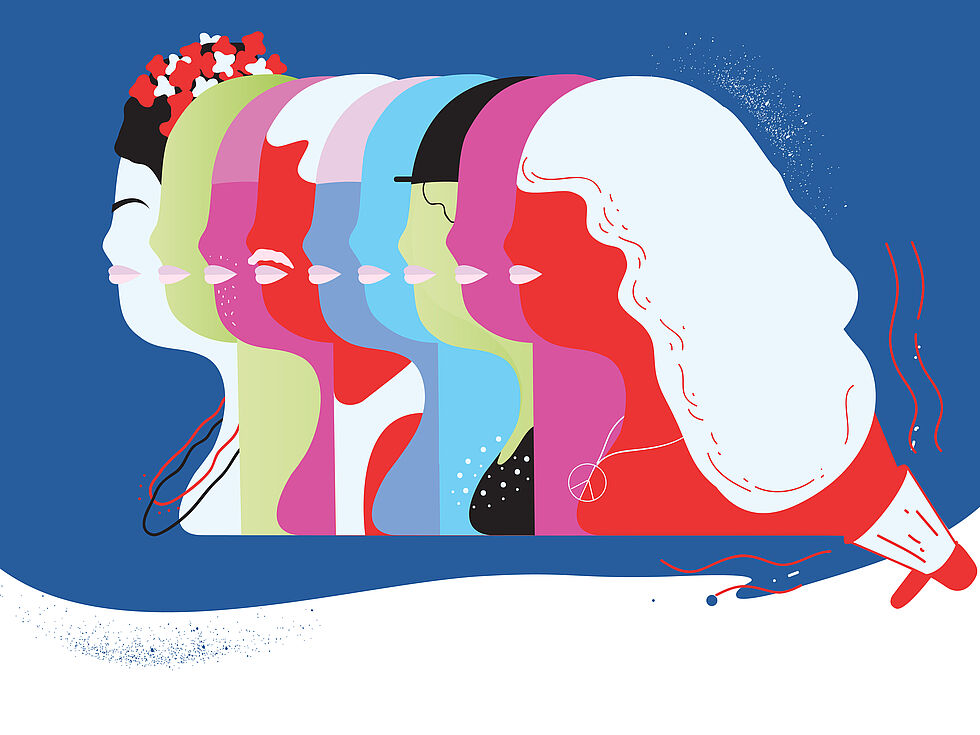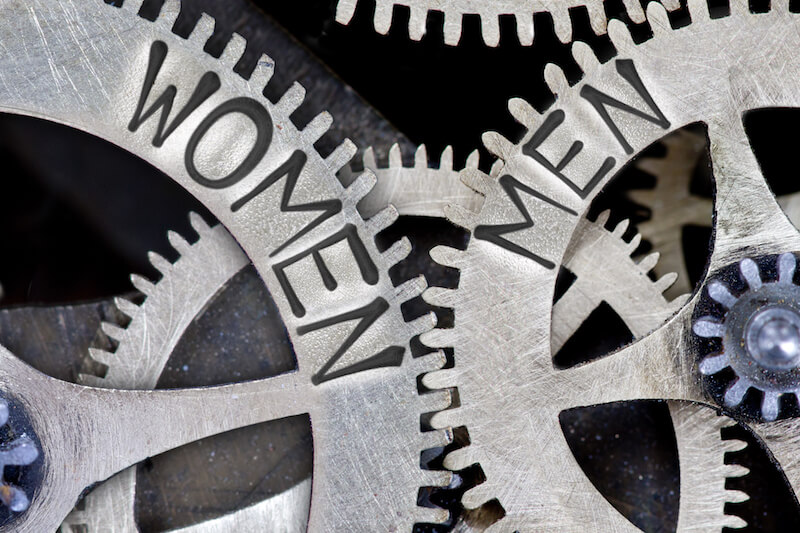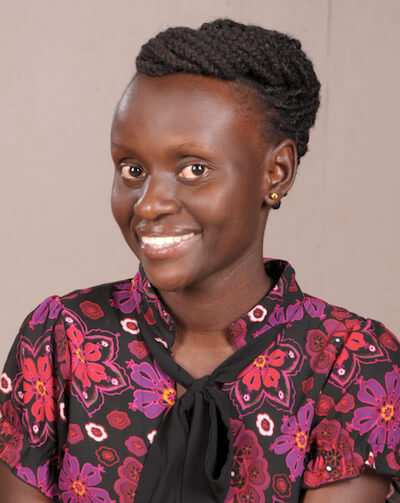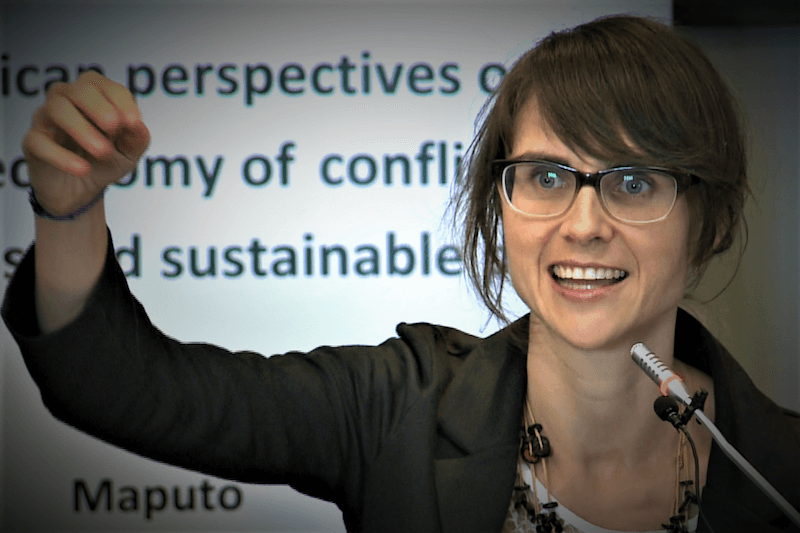Art can influence political action for women`s liberation
“To transform the master`s house we cannot use the master`s tools.” Guided by the mantra of the black-American writer and civil rights activist Audre Lorde, progressive women from all over the African continent met at the invitation of the Friedrich-Ebert-Stiftung (FES) in Maputo, Mozambique, to discuss innovative ways to analyse, critique and change political, economic and social injustices.
Feminist academics, trade unionists, bloggers and women’s rights activists were part of an Idea Laboratory to find joint approaches of feminist knowledge creation, mutual support and political action to transform the neoliberal and conservative narratives that justify the economic exploitation and political instrumentalization of women in many African societies today.
Emilia de Sousa, a multidisciplinary Mozambican artist, whose paintings and drawings confront the image of women in a capitalist and patriarchal society participated in the debate and turned the “feminist power for change” into a piece of art.
Brenda Campos from FES Mozambique talked with the artivist about this experience.
You have agreed to contribute to the Idea Lab of the African Feminist Reflection and Action group in a unique and artivist way. How was this participation for you?
Participating at the Idea Laboratory was an emotional journey. It was very exciting, difficult to describe with exact words and in all the nuances of feelings. Being in a room with all those wonderful women who fight for women's rights and well-being was the realization of a dream, mind opening. The themes dealt with, the discussions, the plans, the union of minds, the power to build bridges between the different individual experiences to form something bigger, an unstoppable collective, was truly inspiring but also challenging for me.
"I don’t recall when exactly I self-defined myself as feminist/artivist in my teenage years. But I remember that the moment I felt complete and empowered was when I started to express my beliefs and frustrations as a black woman through art. It worked like a self-therapy."
I was touched by the personal statements, the strength of the women in the room and our joint struggles, that seem very similar in a way. It made me think, cry and laugh. I gained a lot of energy from the group and tried to put it into the painting, which visualized the unblocking of women’s power by collective action and solidarity.
What motivates you in your feminist art?
I don’t recall when exactly I self-defined myself as feminist/artivist in my teenage years. But I remember that the moment I felt complete and empowered was when I started to express my beliefs and frustrations as a black woman through art. It worked like a self-therapy.
I always focused on the experience of being a woman, even in an unconscious way. The recurring theme in my paintings and drawings is women’s bodies, our struggle to reconcile our bodily reality with the false images of the female that capitalist and patriarchal society try to dictate.
Women are constantly instrumentalized. Our insecurities and doubts are transformed into marketing to sell commercial products, that in the end keep us in the prisons of our complexes and foster separating competition for beauty, doubts, anorexia, bigorexia, shame, and disorders. Self-love, collective compassion, empathy, solidarity of other women, and expressing yourself courageously are the remedies against these negative influences we are exposed to since we are born. But to understand the comforting strength of collective expression and self-acceptance, we often have to come a long, lonely and stony way. This experience inspires my paintings: women`s suffering and the eye- and mind-opening experience to open up, to accept your own weaknesses and your imperfection and to help others to come to the same point of liberation.
What role can art play in our struggle to expand women's rights and reduce discrimination?
Art is inseparable from societies and has a huge influence on political action, particularly in fighting discrimination against women. Artists start from their subjective perspective and experience. They give access to their feelings, reflection, anger, fears—be it by music, painting, illustrations, writing—and this way they deliver messages in a multidimensional, colourful and strong language that goes beyond the rational arguments and makes people understand the essence of social, political or economic problems.
I believe that art exhibitions that touch the themes of feminism, discrimination and abuse of women give a voice to the oppressed and can touch people differently. We have to take art to neighbourhoods and schools, we have to talk about it and make the younger generations experience it so that they can find their ways to express themselves, define themselves and gain the strength to transform their environment into something much friendlier, more just and freer than the one we are living in today.
What change do you wish for in Mozambican society from a feminist point of view?
Feminist debates are growing slowly in Mozambique. There is still the cancer of the magazine cover women. We have to be beautiful, sexy, but not vulgar. Our bodies have to be in perfect shape, not too thin, not too fat. Depending on the spot, hair has to be removed or ironed. We need to be smart and entertaining, but shouldn`t confront fathers, teachers and husbands. We work double and earn less than half, but a good woman doesn`t complain. Not even against screaming injustices, not even against structural and physical violence.
We try everything to assume a personality and life that is not ours. We live in fear of expressing our own voice, our thoughts, our dreams because we do not want to be judged. We were educated to be what we are not and constantly change ourselves to please others. Being yourself, loving yourself and respecting yourself in our society is almost a rebellious act.
Art cannot be silent about this. We have to make women reflect, we have to make society reflect, we have to help this new generation of women and men to find their expressions, their narratives of life. A narrative of compassion, respect, acceptance and humanity. We need to push for the transformation we want. ###
For more information on the work by FES in Mozambique and on the regional work by FES on gender equality and the political feminism project in Sub-Saharan Africa, contact Tina Hennecken Andrade, regional coordinator for gender work and director of FES Mozambique.
Editor's note: The newsletter sent out 29 March 2018 wrongly described Emilia de Sousa as being from Uganda.
ERROR: Content Element with uid "43736" and type "gridelements_pi1" has no rendering definition!
About FES Connect
Connecting people, in the spirit of social democracy, we source and share content in English from the German and international network of the Friedrich-Ebert-Stiftung.








